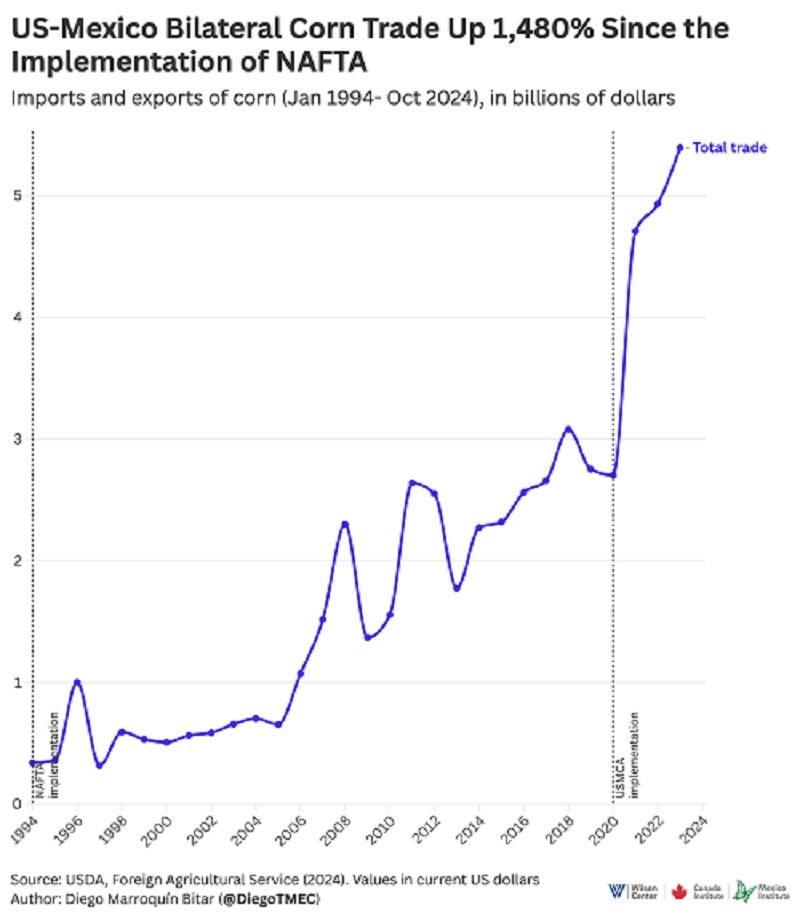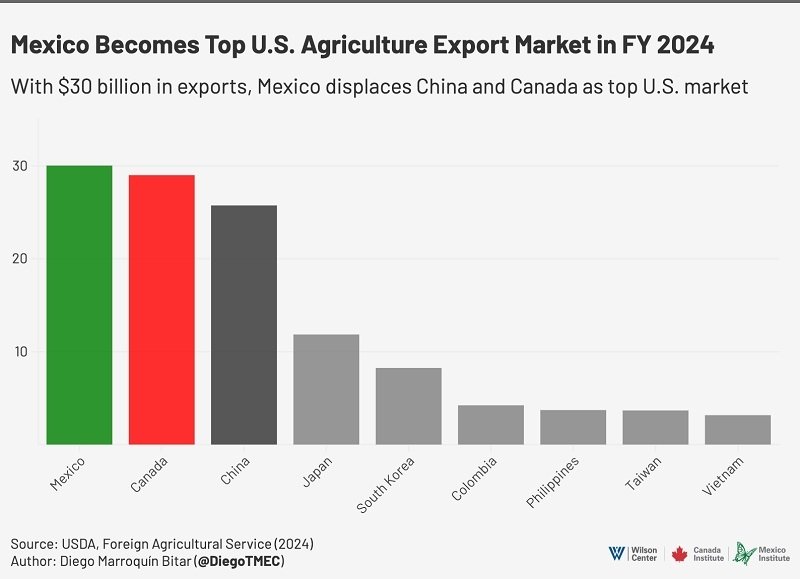Sin Maíz, No Hay País: Why Mexico Must Act on the USMCA Corn Panel Ruling
What happens when two economies intricately tied by corn face a trade impasse? For Mexico and the US this is no longer hypothetical but an urgent reality.
What happens when two economies intricately tied by corn face a trade impasse? For Mexico and the US this is no longer hypothetical but an urgent reality.

Corn is quintessentially Mexican, a staple crop deeply rooted in the country’s cultural and culinary identity. However, the grain has also become a symbol of the deep economic interdependence cultivated between the United States and Mexico over the past three decades. While Mexico has achieved self-sufficiency in producing white corn, primarily used for tortillas, its reliance on yellow corn (known as GMO corn) tells a different story. Mexico is the third largest global consumer of yellow corn and the leading market for US yellow corn exports. Since the implementation of NAFTA and its successor, the USMCA, bilateral corn trade has surged 1,480%, underscoring the mutual benefits of deepened economic ties.

Yellow corn is a critical input for livestock feed and agribusiness in Mexico. Without imports, domestic demand for meat, pork, eggs, milk, and other staples would far exceed supply, leading to significant price hikes, particularly impacting low-income households. Nearly 99% of Mexico’s yellow corn imports come from the United States, accounting for over 40% of total US corn exports. In 2022, these exports supported approximately 133,000 thousand US jobs (USDA, 2024).
Simply put, Mexican families rely on affordable US corn imports to meet dietary needs, just as US farmers depend on the Mexican market to sustain their livelihoods. Moreover, in FY 2024, Mexico became the United States' largest agricultural market, surpassing China and Canada, with corn imports reaching a record $5.3 billion in 2023.

Despite this profound and growing interdependence, policies from Mexico’s former President Andrés Manuel López Obrador (AMLO) and a proposed constitutional reform under President Claudia Sheinbaum threaten to disrupt this trade relationship. These actions risk jeopardizing thousands of US jobs, USMCA compliance, and food security in Mexico.
In 2020 and 2023, AMLO decreed bans on yellow corn for human consumption and mandated a gradual shift to non-GMO varieties in food and feed. These measures prompted the United States and Canada to request a dispute settlement under the USMCA. On December 20, 2024, a trade panel ruled that these decrees violated the agreement’s provisions on market access and sanitary and phytosanitary standards (Chapters 2 and 9, respectively).
The panel concluded that Mexico’s restrictions lacked scientific justification and risk assessments and were inconsistent with international practices. Additionally, these measures created significant uncertainty for US exporters who rely heavily on the Mexican market, undermining the principles of free trade and regional integration enshrined in the USMCA.
Mexico’s response to the panel ruling will shape the trajectory of US-Mexico relations under a second Trump administration and the scheduled review of the USMCA in July 2026. Noncompliance carries three significant risks:
1. Economic Fallout: Retaliation and Market Disruption
An incoming Trump administration could impose tariffs on up to $5 billion worth of Mexican exports, targeting key industries like autos, tequila, and produce. Such tariffs would significantly harm Mexico’s economy while raising prices for US consumers. Simultaneously, restricting yellow corn imports or banning its domestic harvest would exacerbate supply shortages, inflate costs, and undermine the competitiveness of Mexican producers vis-à-vis foreign competitors. States like Kansas, Nebraska, and Missouri, which send more than 95% of their yellow corn to Mexico, as well as Iowa’s corn-dependent economy, would also face severe economic consequences without access to the Mexican market.
2. USMCA Review: A Weakened Bargaining Position
From a strategic standpoint, noncompliance would weaken Mexico’s position in the mandatory 2026 USMCA review. A Trump administration could leverage Mexico’s noncompliance to demand concessions in other areas, such as auto trade, labor standards, or energy policy. Similarly, noncompliance weakens North America’s unified trade bloc at a time when global competition intensifies, particularly with China. The US set a troubling precedent by failing to adhere to a USMCA ruling on automotive rules of origin for over two years. This inconsistency weakened the agreement’s credibility and makes it easier for any party to ignore dispute settlement under USMCA.
3 . North American Integration At Risk
Failure to comply would increase the likelihood of an unsuccessful USMCA review, injecting uncertainty into North American trade and investment relations. This scenario risks undoing 30 years of economic integration and jeopardizes the 17 million North American jobs supported by intra-regional trade. According to a study by World Perspectives, a ban on yellow corn would cause the price of white corn to skyrocket 48% during the first year of implementation. The study also projects significant price increases for products like chicken (14.7%), tortillas (16%), meat (12.6%), and milk (11%).
President Sheinbaum, who took office in October, faces a critical decision: comply with the USMCA panel ruling or risk economic retaliation and strategic setbacks. So far, she has announced her intention to ban the harvest and human consumption of yellow corn at the constitutional level, a move that would fail to bring Mexico into compliance with USMCA.
President Sheinbaum’s response to the USMCA ruling will shape her administration’s legacy and determine Mexico’s role in North American trade for years to come. While corn may be a symbol of Mexico’s identity, economic integration with its USMCA partners and compliance with USMCA are essential for Mexico’s economic growth and food security. To safeguard the hard-fought gains of agricultural trade and protect Mexican families’ well-being, the Sheinbaum administration should:
There's a saying in Mexico that goes: Sin maíz, no hay país (Without corn there is no country). However, without compliance and integration, there is no shared prosperity. It’s time for Mexico to honor its commitments, safeguarding its economic future and its role in a thriving North America.


The Mexico Institute seeks to improve understanding, communication, and cooperation between Mexico and the United States by promoting original research, encouraging public discussion, and proposing policy options for enhancing the bilateral relationship. A binational Advisory Board, chaired by Luis Téllez and Earl Anthony Wayne, oversees the work of the Mexico Institute. Read more


The mission of the Wilson Center's Canada Institute is to raise the level of knowledge of Canada in the United States, particularly within the Washington, DC policy community. Research projects, initiatives, podcasts, and publications cover contemporary Canada, US-Canadian relations, North American political economy, and Canada's global role as it intersects with US national interests. Read more
